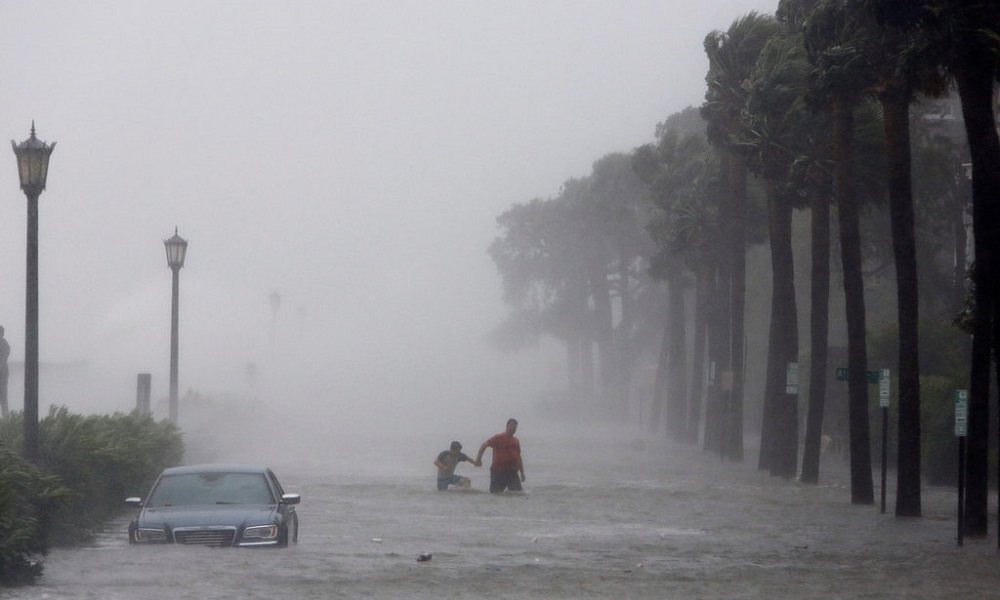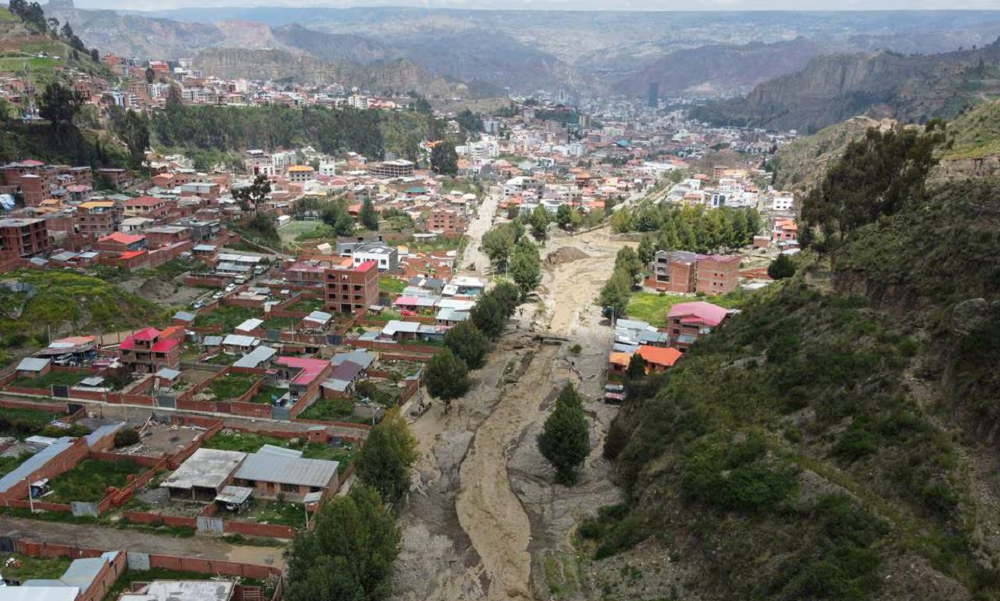Climate Change
Climate leaders sound alarm as Hurricane Fiona pummels Puerto Rico

Hurricane Fiona has battered Puerto Rico, shutting off power to the entire island and sending floods into towns and cities while on the other side of the world, Typhoon Nanmadol hit Japan, forcing evacuations.
Britain’s the Independent reported that according to climate scientist Michael Mann, these kinds of disasters are indicative of the climate crisis-altered world we’re already living in.
“We are witnessing the devastating consequences of climate change now. This isn’t 10 years into the future, it’s not way off in the Arctic, it’s where we live now,” Mann, a climate scientist at the University of Pennsylvania, said.
“It really drives home the importance of taking action now,” he added.
Hurricane Fiona hit Puerto Rico as a Category 1 storm on Sunday, dumping more than 500 mm of water in some places. As a result, the entire island lost power, hundreds of thousands have gone without running water and floods have crippled infrastructure like homes and bridges.
Hurricanes in the Atlantic aren’t new — but as the climate gets warmer, these storms could get a lot stronger on average.
Meanwhile, on the other side of the world, more than eight million people have been told to evacuate their homes as Japan battles one of the deadliest typhoons ever recorded in its history.
The super typhoon Nanmadol left two people dead, more than 100 injured and thousands without power as it made its way across Japan this weekend.
Some areas of Kyushu were reported to have received more than 500mm of rainfall throughout the weekend, which is a figure not seen in the area for decades according to officials.
Tens of thousands of people spent Sunday night in emergency shelters, and almost 350,000 homes are without power. Kyushu’s entire bullet-train service was suspended, and hundreds of domestic flights were canceled.
Most injuries were said to be minor, caused by people who fell down in the rainstorm or got hit by shards of broken windows or flying objects.
Climate Change
UN sounds ‘Red Alert’ as world smashes heat records in 2023

Every major global climate record was broken last year and 2024 could be worse, the World Meteorological Organization (WMO) said on Tuesday, with its chief voicing particular concern about ocean heat and shrinking sea ice, Reuters reported.
The U.N. weather agency said in its annual State of the Global Climate report that average temperatures hit the highest level in 174 years of record-keeping by a clear margin, reaching 1.45 degrees Celsius above pre-industrial levels.
Ocean temperatures also reached the warmest in 65 years of data with over 90% of the seas having experienced heatwave conditions during the year, the WMO said, harming food systems.
“The WMO community is sounding the Red Alert to the world,” said WMO Secretary-General Celeste Saulo, who took over the job in January.
“What we witnessed in 2023, especially with the unprecedented ocean warmth, glacier retreat and Antarctic sea ice loss, is cause for particular concern.”
She later told reporters that ocean heat was particularly concerning because it was “almost irreversible”, possibly taking millennia to reverse.
“The trend is really very worrying and that is because of the characteristics of water that keep heat content for longer than the atmosphere,” she said.
Climate change, driven by the burning of fossil fuels, coupled with the emergence of the natural El Nino climate pattern, pushed the world into record territory in 2023, read the report.
WMO’s head of climate monitoring, Omar Baddour, told reporters there was a “high probability” that 2024 would set new heat records, saying that the year after an El Nino was typically warmer still.
Tuesday’s report showed a big plunge in Antarctic sea ice, with the peak level measured at 1 million km2 below the previous record – an area roughly equivalent to the size of Egypt.
That trend, combined with ocean warming which causes water to expand, has contributed to a more than doubling of the rate of sea-level rise over the past decade compared with the 1993-2002 period, it said.
Ocean heat was concentrated in the North Atlantic with temperatures an average 3 degrees Celsius above average in late 2023, the report said. Warmer ocean temperatures affect delicate marine ecosystems and many fish species have fled north from this area seeking cooler temperatures, Reuters reported.
Saulo, a meteorologist from Argentina who has promised to strengthen global warning systems for climate disasters, said she hoped the report would raise awareness of the “vital need to scale up the urgency and ambition of climate action”.
“That’s why we spoke about the Red Alert because we must care for the people and how they will suffer from these more frequent, more extreme events,” she told reporters. “If we do nothing, things will become worse and that will be our responsibility.”
Climate Change
Pakistan, India and Bangladesh bottom in air quality rankings in 2023

Pakistan remained one of the world’s three smoggiest countries in 2023, as Bangladesh and India replaced Chad and Iran, with particulate matter about 15 times the level recommended by the World Health Organization, data published on Tuesday showed.
Average concentrations of PM2.5 – small airborne particles that damage the lungs – reached 79.9 micrograms per cubic meter in Bangladesh in 2023, and 73.7 micrograms in Pakistan. The WHO recommends no more than 5 micrograms.
“Because of the climate conditions and the geography (in South Asia), you get this streak of PM2.5 concentrations that just skyrocket because the pollution has nowhere to go,” said Christi Chester Schroeder, air quality science manager at IQAir, a Swiss air-monitoring organisation.
“On top of that are factors such as agricultural practices, industry and population density,” she added. “Unfortunately, it really does look like it will get worse before it gets better.”
In 2022, Bangladesh was ranked as having the fifth-worst air quality, and India was eighth.
About 20% of premature deaths in Bangladesh are attributed to air pollution, and related healthcare costs amount to 4%-5% of the country’s GDP, said Md Firoz Khan, an air pollution expert at Dhaka’s North South University.
Indian pollution also increased last year, with PM2.5 levels about 11 times higher than the WHO standard. India’s New Delhi was the worst-performing capital city, at 92.7 micrograms.
Only Australia, Estonia, Finland, Grenada, Iceland, Mauritius and New Zealand met WHO standards in 2023.
The IQAir report was based on data from more than 30,000 monitoring stations in 134 countries and regions.
Chad, the world’s most polluted country in 2022, was excluded from the 2023 listings because of data issues. Iran and Sudan were also taken off the 2023 list.
Afghanistan was meanwhile not included on the list.
Climate Change
In Bolivia, heavy rains prompt authorities to declare state of emergency

Heavy rain in Bolivia’s capital, La Paz, prompted authorities to declare a state of emergency, a government document showed on Sunday, after overflowing rivers destroyed many houses over the weekend.
Bolivian President Luis Arce pledged to send heavy machinery and 3,000 troops to prevent further damage, according to the document, Reuters reported.
Heavy rains caused flooding in several neighborhoods and isolated parts of the city by cutting water, electricity and roads.
“We are deeply concerned by the difficult situation that our municipality in La Paz is going through,” Arce said in a post on social media platform X.
One person died over the weekend in La Paz because of the heavy rains, while nearly 50 people have died in deluges across the country since the rainy season began in January, according to official data.
-

 Sport4 days ago
Sport4 days agoACL fever grows as fixtures finalized
-

 World4 days ago
World4 days agoUS will not take part in any Israeli retaliatory action against Iran
-

 Latest News4 days ago
Latest News4 days agoOver 50 people dead in traffic accidents over Eid
-

 Latest News4 days ago
Latest News4 days agoUS identifies Kabul airport suicide bomber
-

 Latest News4 days ago
Latest News4 days agoGood rains enable DABS to increase power production in Kabul
-

 Business4 days ago
Business4 days agoAfghanistan-Kazakhstan chamber of commerce opens in Herat
-

 World3 days ago
World3 days agoIsraeli military vows response to Iran attack as calls for restraint mount
-

 Latest News3 days ago
Latest News3 days agoPakistani police give Afghans in Balochistan one day to leave

























